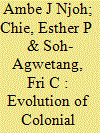|
|
|
Sort Order |
|
|
|
Items / Page
|
|
|
|
|
|
|
| Srl | Item |
| 1 |
ID:
183688


|
|
|
|
|
| Summary/Abstract |
The study examines Germano-Anglo colonial towns in Cameroon to determine factors accounting for the scarcity of infrastructure as well as streets and places with Eurocentric names. Using primary and secondary data, it demonstrates that the lack of infrastructure in the polity is a function of negligence by colonial and post-colonial authorities. With few pieces of public infrastructure, the authorities have had few streets and places to attribute names from Eurocentric lexical dictionaries. These findings contribute to knowledge of the relative impact of endogenous and exogenous factors on toponymic traditions as well as inter-country differentials in African countries’ development profiles.
|
|
|
|
|
|
|
|
|
|
|
|
|
|
|
|
| 2 |
ID:
098508


|
|
|
|
|
| Publication |
2010.
|
| Summary/Abstract |
Africanists have long criticized the social construction, and consequences, of technical knowledge. Colonial science was seen as a particularly problematic enterprise, moulded by authoritarian colonial states, wherein science 'delineated the relationship of power and authority between rulers and ruled'. Much the same critique has been applied to post-colonial experts and expertise, becoming almost paradigmatic in the literature. This article seeks to re-open this debate, pointing to the diverse and changing location of scientists; the salience of scientific work in constructing categories and understandings for historians and social scientists; the value of trying to understand scientific explanations, as opposed simply to analyse their application in coercive policies; and the degree to which experts have sometimes incorporated local knowledge. The article draws examples from veterinary science and policy in southern Africa, and seeks to move beyond the inversions of colonial thinking in post-colonial analysis and provide instead a platform for interdisciplinary research strategies.
|
|
|
|
|
|
|
|
|
|
|
|
|
|
|
|
| 3 |
ID:
161624


|
|
|
|
|
| Summary/Abstract |
This paper analyzes strategies for articulating power and effectuating social control in the built environment by French colonial authorities in New France and colonial Africa. The former was a settler colony while the latter comprised colonies of economic exploitation. Despite their different colonial status, they shared much in common. In this regard, French colonial authorities recycled spatial control strategies they had employed in New France a century earlier for use in Africa. However some changes commensurate with the changing priorities and objectives of the French colonial project were instituted. In particular, recycled policies from New France were made more stringent, less tolerant and ostensibly oppressive in French colonial Africa.
|
|
|
|
|
|
|
|
|
|
|
|
|
|
|
|
| 4 |
ID:
126674


|
|
|
|
|
| Publication |
2013.
|
| Summary/Abstract |
In response to a widespread idea of the European Union as a "peace project," an idea disseminated especially after the EU received the 2012 Nobel Peace Prize, this essay retrieves some of the historical causes of the foundation of the European Economic Community (EEC) in 1957. The essay emphasizes specific geopolitical and colonial incentives that had lain behind the European integration project ever since the pan-European blueprints the interwar period and which became critical with the Suez crisis and decolonization movements of the 1950s. As the essay demonstrates, practically all of the visions, movements, and concrete institutional arrangements working toward European integration during this period placed Africa's incorporation into the European enterprise as a central objective. As much of the scholarly, political, and journalistic accounts at the time testify, European integration was inextricably bound up with a Eurafrican project. According to the intellectual, political, and institutional discourse on Eurafrica, a future European community presupposed the transformation of the strictly national colonial projects into a joint European colonization of Africa. Strong evidence suggests that these ideas were instrumental in the actual diplomatic and political constitution of the EEC, or of Europe as a political subject, in 1957. The essay discusses why the EU's colonial origins have been consigned to oblivion in mainstream research and why this history is of continued concern to the world.
|
|
|
|
|
|
|
|
|
|
|
|
|
|
|
|
|
|
|
|
|